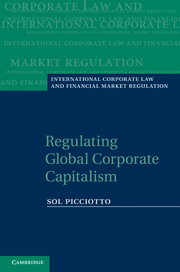Book contents
- Frontmatter
- Contents
- Preface
- Acknowledgements
- Table of cases
- Abbreviations and acronyms
- 1 Transformations of global governance
- 2 Liberal internationalism: strengths and limits
- 3 From interdependence to fragmentation
- 4 Corporations and competition
- 5 Corporate rights and responsibilities
- 6 International taxation
- 7 Regulation of international finance
- 8 The WTO as a node of global governance
- 9 Intellectual property rights
- 10 Law and legitimacy in networked governance
- Bibliography
- Index
8 - The WTO as a node of global governance
Published online by Cambridge University Press: 05 June 2012
- Frontmatter
- Contents
- Preface
- Acknowledgements
- Table of cases
- Abbreviations and acronyms
- 1 Transformations of global governance
- 2 Liberal internationalism: strengths and limits
- 3 From interdependence to fragmentation
- 4 Corporations and competition
- 5 Corporate rights and responsibilities
- 6 International taxation
- 7 Regulation of international finance
- 8 The WTO as a node of global governance
- 9 Intellectual property rights
- 10 Law and legitimacy in networked governance
- Bibliography
- Index
Summary
The WTO has been denounced by its critics and lauded by its supporters as a standard-bearer for free trade. In fact, the WTO Agreements erected a complex framework of rules which delineate the battleground for struggles over fairness and justice, the right to regulate and the forms of regulation, in a wide range of international economic issues. Hence, following its establishment in 1995, the World Trade Organization (WTO) quickly became the focus of debate about governance of the world economy. Its limitations as an organization reflect the enormity of these global governance issues, the inadequacy of existing political structures, and the forms of contemporary economic power.
The package of agreements negotiated through the ‘bargain-linkage diplomacy’ of the Uruguay Round (UR) negotiations established the WTO as a central institutional framework for the international coordination of economic regulation. This completed the organizational triumvirate originally designed at Bretton Woods, with the WTO now complementing the IMF's role in monetary management and that of the World Bank in development finance. However, the WTO is a different animal from the International Trade Organization (ITO) proposed in 1946, which was still-born due to fears of opposition from the US Congress. The Havana Charter envisaged the ITO as an institutional framework through which a managed relaxation of trade barriers would go hand in hand with measures to stabilize primary commodity prices, control business monopolies and restrictive practices, and ensure respect for internationally agreed labour standards (Dell 1990; Drache 2000).
- Type
- Chapter
- Information
- Regulating Global Corporate Capitalism , pp. 299 - 381Publisher: Cambridge University PressPrint publication year: 2011

